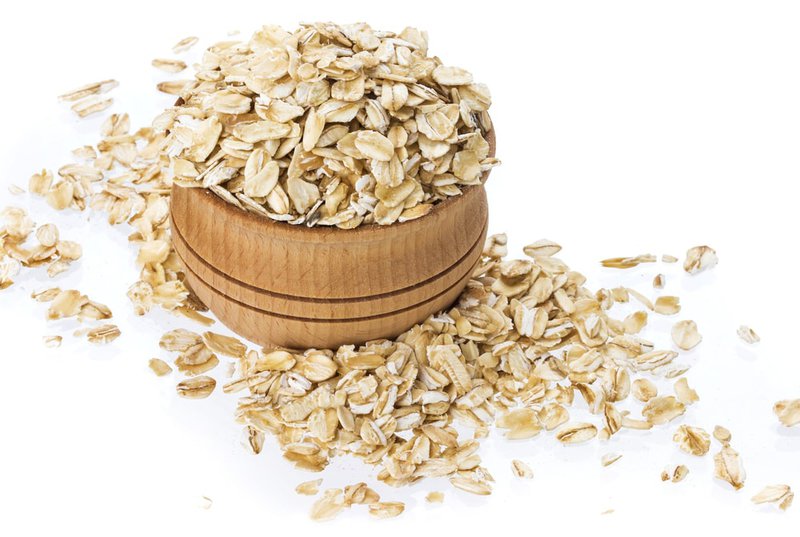Oats are a healthy staple breakfast item enjoyed for generations. It is considered a superfood since it packs numerous nutritional benefits like protein, vitamins, and minerals. It is also a good source of soluble fiber, which can aid digestion and regulate blood sugar levels. But can dogs eat oats, too?
Yes, dogs can eat oats but only in moderation. Since oats are low in gluten, these are good alternatives to bread if your dog is allergic to wheat products. Some commercially available dog foods contain oatmeal as a carbohydrate alternative.
While it is generally safe for dogs to eat oats, you may think to proceed with a little caution as only certain preparations are truly healthy for your fur babies.
In this article, we will tackle the benefits of oats, their nutritional value for our dogs, and also the risks involved if given in large amounts. We will also explore the various ways you can serve oats to your dogs.
Are Oats Beneficial For Dogs?
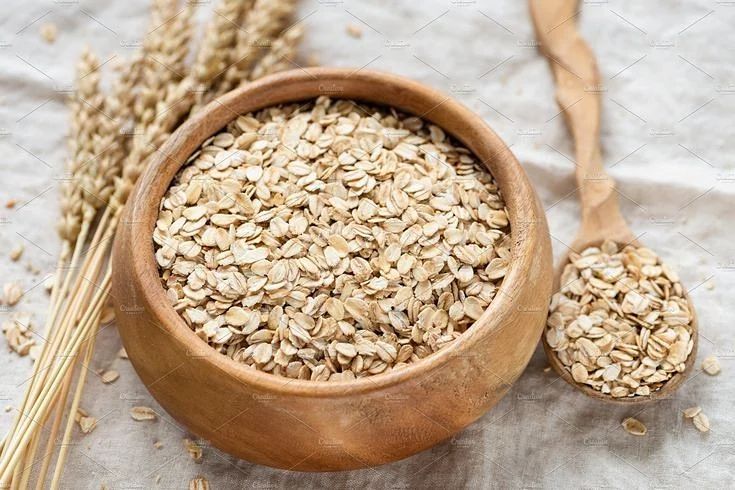
Yes, oats are good for our dogs. The nutritional value of oats is almost the same with us humans as well as our pooches. It is one of those guilt-free foods you can occasionally add to your dogs’ meals.
We’ve listed below the benefits and nutritional values of oats:
Fiber
Oats are a rich source of dietary fiber, both soluble and insoluble.
Soluble fibers, like beta-glucan, form a coating of gel around digested food that aids in lowering cholesterol and stabilizing blood sugar levels. Soluble fibers also help in weight management by reducing the appetite of obese dogs.
Insoluble fibers, on the other hand, helps in moving food along the digestive tract, making it ideal for dogs suffering from constipation.
Cooking oats plainly with water can also add the necessary liquid to bulk up the stool.
Protein
Compared to other grains, oats are a good source of protein and fats. These contain a legume-like protein called avenalin that provides essential amino acids to the body.
Antioxidants
Oats contain the antioxidant avenanthramides. This compound shows anti-inflammatory properties, which help prevent coronary heart disease by oxidizing cholesterol plaques.
It also has anti-itching properties, which help prevent allergies and skin irritations.
Linoleic Acid
This compound is a polyunsaturated omega-6 fatty acid that promotes a healthy heart. It improves insulin sensitivity and blood pressure, as well as contributes to our pets’ healthy skin.
Vitamins And Minerals
Oats are nutrient-rich with lots of B-complex vitamins, iron, magnesium, vitamin A, selenium, zinc, and phosphorus.
Gluten-Free
Oats are naturally gluten-free, so dogs suffering from wheat allergies can benefit from eating oats by reducing bloating, diarrhea, or constipation.
Are There Other Benefits Of Oats To Dogs?
Some dog shampoos contain oats to help ease skin irritations.
Oats have organic chemicals, like saponins, that have antifungal and antibacterial properties, which cleanse and add body to their fur making it thicker and smoother.
Dog shampoos containing oats can also relieve itchiness and prevent hair loss.
What Type Of Oats Are Good For Dogs?
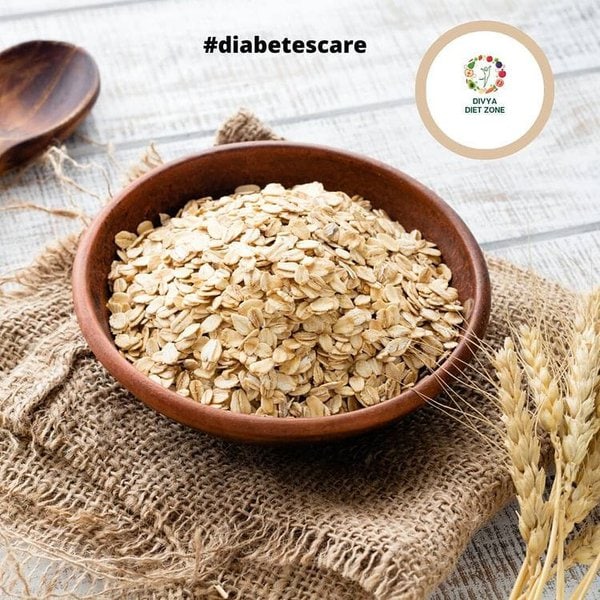
There are several types of oats available in the market. The difference lies in the way they were processed resulting in varying cooking times and texture.
All of which pretty much has the same nutritional value for your dogs as long as it is plain and contains no additives.
Steel-Cut Oats
Sometimes referred to as Irish or Scottish oats, these oats are processed by chopping whole, unprocessed oats or groats into little pieces resembling something like rice. It takes around 30 minutes to cook and has a chewy texture.
Rolled Oats
These are lightly processed oats that have been steamed and flattened. The flaky texture makes it easier to absorb water and cooks in less time than steel-cut oats.
Instant Oats
This is the most processed of the three. Also called quick oats, they are pressed more thinly than rolled oats and are pre-cooked and dried.
Instant oats have a mushy texture and cook in about 5 minutes. Some products in the market have added sugar or artificial sweeteners like xylitol, so check labels first when giving them to your dog.
How Do I Serve Oats To My Dogs?
Oats should be served cooked and simple and preferably with no added flavorings or toppings. Raw or uncooked oats could be hard to chew and swallow and can cause choking. It can also be hard for them to digest.
Cook the oats in plain water until it is chewable. Avoid cooking it with milk since a lot of dogs are sensitive to lactose, and their gut has difficulty breaking down milk.
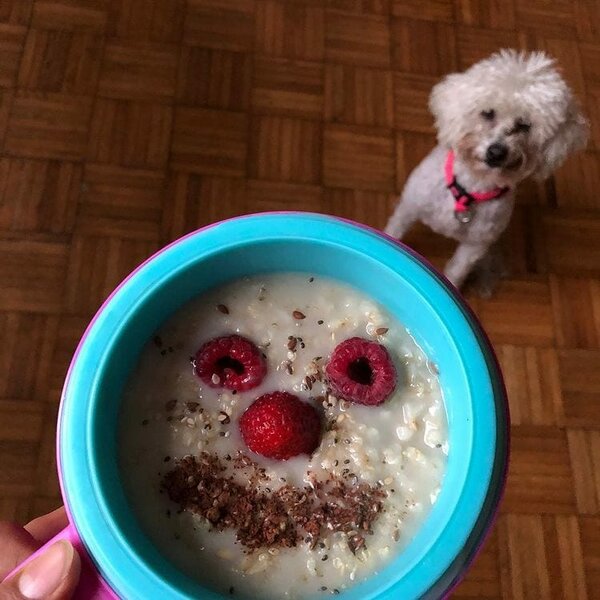
How Many Oats Can I Give My Dogs?
Only a small amount added to their regular meal is fine. A cup of cooked oatmeal provides around 150 calories and adding a tablespoon or two to their kibble is enough calories they would need in a day.
Nutritionists suggest a serving size of one tablespoon of cooked oatmeal for every 20 lbs of your dog’s weight.
Can Dogs Eat Oatmeal Every Day?
Oats should never replace your dog’s regular meal. It should only be given occasionally as a snack or added to their regular food minimally.
While it contains some protein, vitamins, and minerals, it is not enough to cover your dog’s daily nutrition needs.
For dogs with digestive issues like constipation, a few cooked oats could be added to their regular kibble to stimulate their gastrointestinal tract.
Can I Give My Dogs Oat Milk?
Yes, oat milk is a great alternative to dairy milk. It is made by blending oats with water and straining it, leaving the pulp behind.
Given as an occasional treat, it can provide your furry pets with vitamins and minerals without the usual risk associated with lactose intolerance.
What Can I Add To Make Oatmeal Tastier For My Dogs?
If you wish to add some zest to the bland oatmeal, there are some extras you can add without sacrificing your dog’s health. Just remember to keep it in moderation, most preferably as an occasional snack.
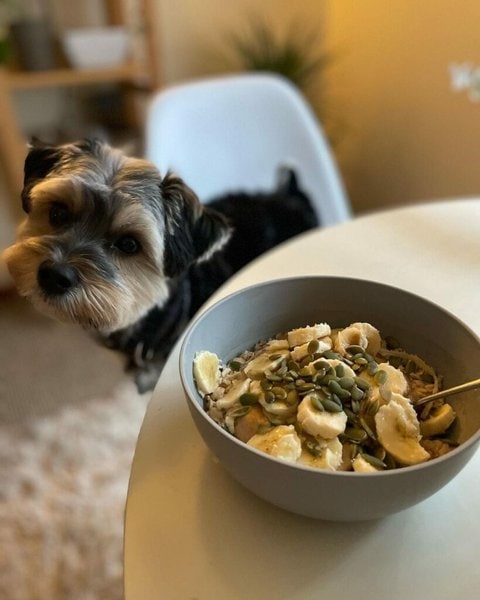
Fruits
Bite-sized pieces of bananas, apples, mangoes, and berries like strawberries or blueberries are some good additions to their oatmeal. But stay away from cherries, avocados, grapes, or raisins since these are toxic to dogs and can cause severe poisoning in some cases.
Peanut Butter
A small dollop of peanut butter added to oats gives it extra flavor. ½ teaspoon for a small dog or a teaspoon for a large dog is enough to make their oatmeal more savory.
Yogurt
A spoonful of plain yogurt adds extra protein and calcium to oatmeal. Just make sure to avoid flavored yogurts that have added sugar which could spike your dog’s glucose levels.
Are There Risks In Feeding Oats To Dogs?
Yes, some of the foods we humans pair with oatmeal could be toxic or harmful for our dogs if given in large amounts.
In this section, we’d tackle what you should avoid or refrain from mixing with our dogs’ oatmeal. Here are some to watch out for:
Sugar
Avoid adding sugar to the oats or using instant oats with sugar or xylitol. Too much sugar can cause obesity and dental problems later in their lives. Xylitol is toxic for our pooches because it can lead to liver problems.
Honey or maple syrup is fine but only in small quantities.
Spices
Adding a sprinkle of cinnamon or ginger is okay if you want to add some flavor. But adding other spices such as paprika or black pepper is not recommended since these could upset their stomachs.
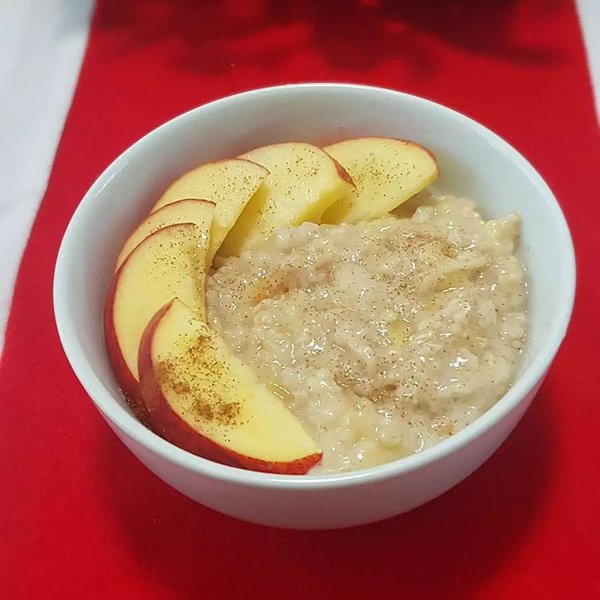
Vanilla
Vanilla flavorings or vanilla extracts are also ingredients we should not add to our dog’s oatmeal.
Vanilla contains alcohol that could pose a serious health risk for fido, especially for smaller dogs.
Salt
Salt, as well, is not a good idea. While a small amount may not hurt your dog, excess salt can cause vomiting, nausea, and diarrhea.
Nuts And Seeds
While most nuts and seeds are not toxic to dogs, giving them small amounts can sometimes trigger diarrhea and some can even be a choking hazard.
The high content of fat in nuts also could lead to obesity and problems with their pancreas. One nut to avoid, though, is macadamia nuts which are highly toxic to dogs.

